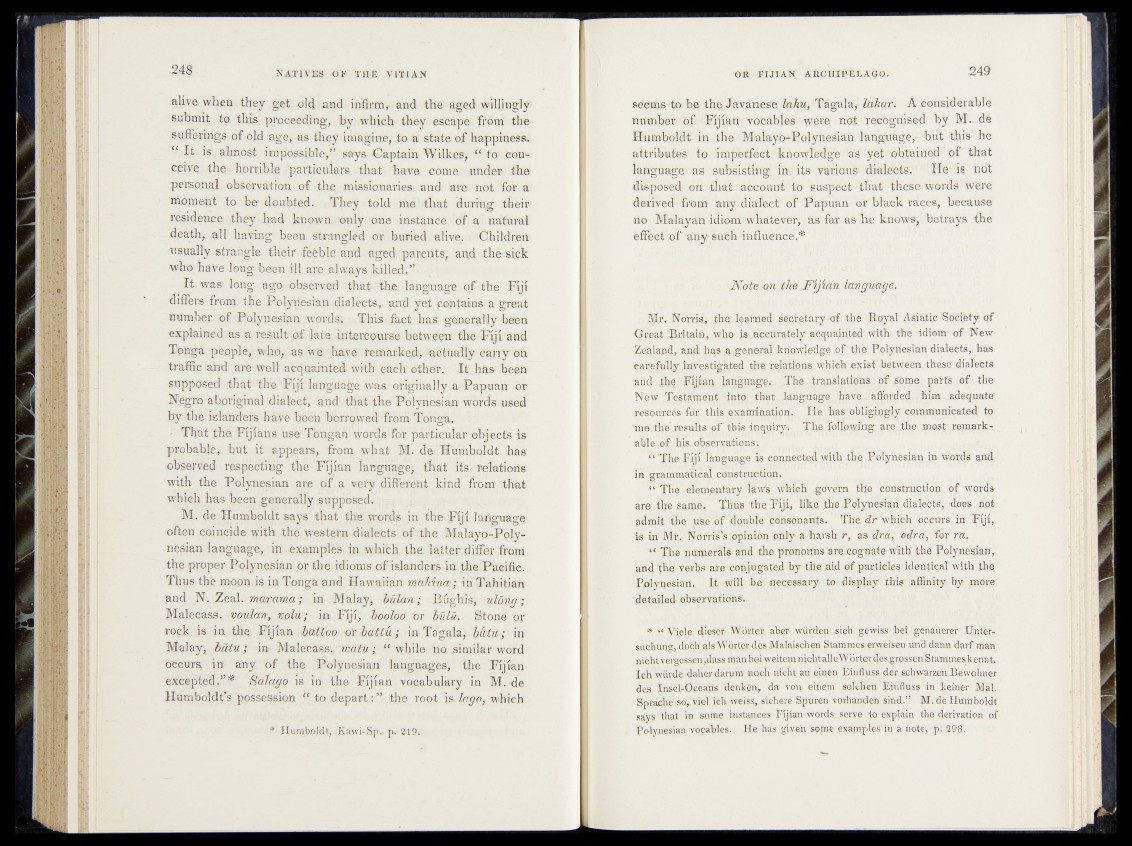
alive when they .get old;'and infirm, and the aged; willingly
submit to tbist.|»jOOoeSing, the
sufferings: of oldj.age^ .as they imagine* to a state of happiness.
V -Iti% aimc^p,injpossihle^Ilsays >,<3aptoiri Wilkes/ %to?: eon-
fthnf horpide KpaftieulaES 'thati have ;kehM#fiund6n; the
peponali ohservation ; of the missionaries and are tfnhfe^fdis a
moment to be •doubted. They told me that during their
resideneesythey^had known^^»ly one instance of a natural
death, all having been strangled or buried alive, n-Children
usually strangle their feeble and aged parents, and the sick
who have long been ill are always killed.”' ■
It. was long ago observed that the* language -of the Fiji
differs from the Polynesian dialects, and yet contains a great
number of Polynesian words. This fact has generally been
explained as a result of late intercourse between the Fiji and
Tonga people, who, as we have remarked,- actually cany on
traffic and are well acquainted with each other. It has been
supposed that the Fiji language, was originally a Papuan or
Negro aboriginal dialect, and that the Polynesian words used
by the islanders have hhbn'borrowed from Tonga’.
' That the Fijians use Tongaii words for particular objects is
probable, but it appears, from what M. de Humboldt has
observed respecting the Fijian language, that jfts relations
with the Polynesian are of a very different kind from .-that
which has been generally supposed.
M. de Humboldt says that the words in the Fiji lansruasre
often ^oineide with the western dialects of the Malayo-Poly-
nesian language, in examples in which, the latter diffeb from
the proper Polynesian or the idioms of islanders in. the Pacific.
Thus the moon is in Tonga and Hawaiian maliina ; in Tahitian,
and N.Zeal. marama; in Malay, Zm/ara; Bfighis* ulong;
Malecass, voulan, volu; in Fiji, booloo or bulu. Stone or
rock is in the Fijian battoo or battu; in Tagala, batu; in
Malay, bdtu ; in Malecass. "main ; u while no similar word
occurs in any of the Polynesian languages, the Fijian
excepted.” * Scdago is in the Fijian vocabulary in M. de
Humboldt’s possession “ to depart: ” the root is lago, which
* Humboldt, Kawi-Sp, p, 219.
seems to be the Javanese laku, Tagalay lakar. A considerable
number- of I Fijian/ vOcaMes^were not5 ‘ recogni sed by M. de
Humboldt- in -the'- Malayo-PolyUesian language*/ but this he
attributes'' to^toipferfectfkno’wledgV^ys -yeft1 obtained* of that
languageas 'subsisting 'in*-its various dialects'.'1*'5 He is not
disposed,ion that -account to 'suspedt that" thelfe Words were
derived-from any dialect of PapharF for'black races, because
rio Malayah -idiom whatever, as far as he knows," betrays the
effect of any suchrinfl-ufoflce.* .
Note on th& Wytcm laMguage,
Vlr. Norris, the learned: secretary;óf. the Royal AsiytióSociety óf
Great Britain, who is accurately acquainted, with the idiom of New
Zealand,.and, fias-a general knowledge -óf • th^jPolynesian dialects, has
carefully investigate*! .the relations which e^iri!hètween-these dialects
and the Figiap langn^gf.., J eM*- transl^tions^pf spme parts -of the
ifew Tes'/dnient.'lnto that langu&gq4‘]j£Vft., afforded ^him adequate
resources for this examination. He; has obligingly communicated to
me the results of t^)is inquiry. The following are the most remarkable
fof his observations.,
“ The Fiji language is connected with the Polynesian in words and
in grammatical construction.
“ The elementary laws which govern the construction of words
are the same. Thus the Fiji, like’the Polynesian dialects, does not»
admit the usé of 'clóuÜIe cohsdnants. The dr which óecurs in Fiji,
is in Mr. Norrife’s opinion only a haräh'r, äs c?r'a, ‘ o'dra, for ta.
“ The numerals and the prónouns are cognate with the Polynesian,
and the verbs are conjugated by-the aid of particles' identifcal with the
Polynesian. It will be necessary to display5 this "affinity by more
detailed observations.
* “ Viele dieser Wörter aber5 würden* sieh/gewiss- bei ge'üäuerfer*"Untersuchung,
dochals Wörter d-es Malai sehen Stammester^èisen- und .dann darf mau
nicht vergessen, dass man bei weitem niclji tall e W ör/erdes grpsjriiji^itammesjsennt.
Ich würde daher darum noch nicht aneinto Einflhs^dhKschWarzen Bewohner
des Insel-Oceans dénken, da von einem' sofehen Einfluss in keiner Mal.
Sprache* so, viel ichw^eiS^, taBsel® Spuren vorhandeh?sind.’p M. de*Humboldt
says 'that in some-instances Fijian words serve to explain the derivation of
Polynesian vocables. He has given some examples in a note, p. 298.